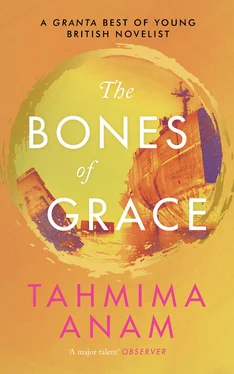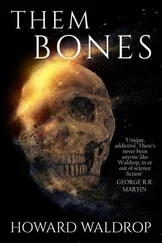My parents are now, forty years later, starting to come to terms with what that war has done to them. All the good things — their marriage, woven with the broken threads of what they lost; the sweetness of knowing their lives have meant something, for they are not, like so many, plagued by the pain of insignificance. And the bad — both their brothers lost, my father’s on the battlefield, and my mother’s, later, to religion; the fear that they may not, after all, have gotten it right, because every time the country falters, they take it personally, as if there was a tainted seed planted then that corrupted all that followed.
Recently they have been given a chance to take account in a trial for the men who aided and abetted the army. The word ‘genocide’ is in my home like the word ‘highway’, or ‘acorn’, may be in yours. My mother has given up her medical practice and she’s helping to gather research for the prosecution, travelling across the country to interview survivors and witnesses. She exists in a shroud of other people’s memories as she gently, patiently coaxes out their stories and writes them down. She is remote and sad and emerges rarely, as if from a deep sleep, and in these moments she is joyful, as if she is discovering, for the first time, that the war was won after all. And then, inevitably, she withdraws into those dark places. My parents whisper to each other at night, out of earshot. They follow the trial, every episode, every motion, every witness. Me, I don’t want to know. I seek the connection, but resist when the opportunity is offered. My heart is a nomad, still, after so many years of being in this country, child to these parents.
Can you ever know, Elijah, the feeling of being from a place you wish you could hate but are forced to love? Can you know what it is like to be from a country that everyone else is trying to escape? It is like running into a burning building. If you ask me, I’ll tell you all the things I love about it — the smell of paperbacks in the winter, the cold-but-warm gust of monsoon air, the burnished wood on the desk I had as a teenager, dark from the oil of my skin, lying under the ceiling fan on my grandmother’s bed, the taste of egg and parathas in my mouth. The love exists, but its domain is small, located in the particular bodies of particular people. My parents fought a war for this country, that is how much in love with it they are. There is a memory at every turn, an affection for every change in season, roots in the ground so deep you would have to tear them apart to separate person from place, body from soil. But not me.
One day my mother returns from the courthouse and she puts her head in her hands and cries as if someone is beating her. I stand a little apart and watch her shoulders sagging. My father goes to her and puts his arms around her and they sit that way for a long time. They see me and we look at each other and I stand there and they don’t ask me to enter or leave and I don’t enter or leave. I have witnessed it before, this thing that passes between them like a current, the knowledge that needs no explanation, and I know that she is remembering something, or remembering it through the story of someone else, heavy with what she knows and what she has recently learned, because it is always worse than she remembers, and every memory takes something away from the rest of her life, because she came away unscathed, and the burden of being who she is — whole — weighs heavy on her. She is a person with guilt at the very core of her being, and she spends her days compensating others for the fortune that brought her a life, a marriage, me. She is a moral economy all to herself, painted in tiny strokes of the past.
Someone had been nearly acquitted that day. They hadn’t been able to make the case against him and he had gotten off with a light sentence. With a change in government, even this small verdict might be overturned, and the man might walk free. On the streets, there were protests, and people painting their faces in green and red, and children with rope around their necks, holding up signs that read HANG THE BASTARD. My parents are not the only ones who want a reckoning.
What would you do with this messy history, Elijah? Your chamomile-scented home, your overfed cat, lemonade in the refrigerator, and that family tree, so august, no mystery blood, no revolutions, Indiana Jones an anchor in your provenance.
That afternoon, your message had read: Don’t You Pay Them No Mind .
‘Your mother and I are worried,’ my father said. Ammoo had left early for a field trip to Barisal, and we were on the balcony overlooking Gulshan Lake. I looked down and saw the green water, the rim of garbage that lapped the shore, the necklace of apartment buildings that sat at the edge of the water on the other side.
‘I don’t know what to do,’ I said. ‘I keep asking myself and I just can’t tell.’ I remembered seeing a drowned cow in the lake soon after we moved in, and I had returned again and again to the balcony, watching with disgusted fascination as its intestines burst out of its body and floated into the reeds.
‘Why don’t you come to the factory? They love it when you visit. In fact, you could come and work for me.’
‘You would give me a job?’
‘I could use that Harvard brain.’
‘Ammoo would have a stroke.’ I found myself laughing with him. After years working for the government, my father had decided to go into business, and it was Rashid’s father, Bulbul, who had lent him the money to open a textile factory. Freedom Fabrics foundered for the first few years, the costs outweighing the little profit it earned, but it rose to success when Western clothing importers realised my father’s factory was one of the few that paid a decent wage and didn’t employ children. They put Fair Trade labels on his clothes and sold them at department stores and boutiques, the price tags printed on crumpled brown paper. By the time I’d finished college, our financial circumstances had changed dramatically, but Ammoo and Abboo remained conflicted about their increasing wealth, because it interfered with their idea of themselves, forged all those years ago during the war. They kept to their Spartan lifestyle, driving their old Toyota, holding on to the battered cane set they had been given as a wedding gift. Their one concession was the apartment in Gulshan, and they had only bought that on the urging of Rashid’s parents, who had themselves made the move across town years ago.
‘I’ll think about it,’ I promised, remembering the last time I had been to the factory, the rows of sewing machines, the smell of kerosene and cotton, women bent over their work, plastic barrettes in their hair. Abboo reached out and held my hand, and I glanced at the stub which was all that was left of the finger he had lost in the war. Then he was looking out at the water, shaking his wrist to loosen his watch. I felt like there had never been a moment such as this one, and I was about to ask him to tell me something about the adoption, something he hadn’t yet told me, something that would break it open and make it all right to talk about. But he cleared his throat and a lone fish broke the surface of the lake and the moment passed without commotion.
Ammoo flew back in time for dinner, strangely elated. We avoided asking her about the trial or the witnesses she had gone to find. Anyway, she wanted to talk about yoghurt. ‘The food in Barisal is incredible,’ she said. ‘I tasted a superlative sweet doi. And the fish was also excellent.’ The fish reminded her of something. ‘Where’s Rashid?’ she asked. It was Friday, and Rashid always came to our house for dinner on Fridays.
Bashonti had made egg curry. I put a piece of egg in my mouth and chewed slowly. ‘I didn’t really feel like seeing him tonight.’
Читать дальше












